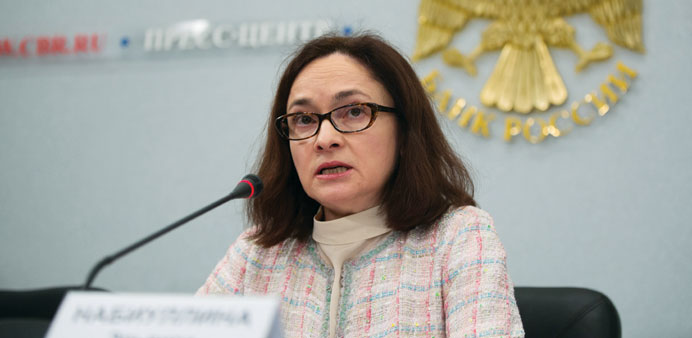Nabiullina: Keeping all options open.
Reuters
Moscow
The Russian government is considering how to help state development bank VEB, central bank governor Elvira Nabiullina announced, after a report said the ailing bank might be given treasury bonds worth over 1.5tn roubles ($23bn).
The huge size of the potential bailout could heighten worries about the overall state of Russia’s economy since analysts have warned that its Reserve Fund, used to cover the deficit, is only deep enough to last for another two years.
Battered by low oil prices, Western sanctions and a weak rouble, the proposed aid package is also so large it could impact Russia’s credit rating which two agencies downgraded to junk status earlier this year.
VEB or Vnesheconombank is a non-commercial state Corp the Kremlin uses to develop the economy and manage state debts. Its ability to raise capital has been limited since 2014 when Washington put it on a sanctions list over the Ukraine crisis.
It does not have a banking licence and is therefore not subject to the same scrutiny as its commercial counterparts. It is also heavily weighed down with loans it made to help finance the 2014 Sochi winter Olympics, Vladimir Putin’s pet project.
“Different options (about how to help VEB) are being discussed now,” Nabiullina, the central bank governor, told the lower house of parliament yesterday. “It is too early to say more. We have simply carried out a valuation of many of its assets.”
Vladimir Tikhomirov, an economist at BCS Financial Group in Moscow, said that rather than finance a support package directly from the budget, which would require complicated amendments being rushed through parliament, the government may be tempted to tap a sovereign fund, the National Wealth Fund.
However, running down this fund would do little to alter the huge fiscal burden as it would reduce the funds available to Russia in future.
“The problem here is that if they do spend from the National Wealth Fund, the fund would drop by approximately one third, weakening the overall financial position of the government, and its ability to support the economy, state companies or the budget,” he said.
The $23bn value of the proposed bond transfer, reported by the Kommersant newspaper, is equal to around one tenth of Russia’s annual budget and would exceed a previous onetn rouble recapitalisation scheme extended to 27 major Russian banks.
Russia’s Deputy Finance Minister Alexei Moiseev said that VEB would honour its debt obligations in all circumstances as they are backed by the government. Nabiullina spoke after Kommersant, citing unnamed sources, said the state Corp was in trouble because of a large number of bad loans on its books.
A VEB source confirmed to Reuters that there were problems with its loans portfolio, but declined to disclose its value. Kommersant said the government was also considering removing
problematic assets from VEB’s balance sheet, including a series of loans made to firms involved in the construction of facilities for the 2014 Winter Olympics in Sochi. Kommersant said the plan to boost VEB’s capital was discussed at a meeting between Russian First Deputy Prime Minister Igor Shuvalov and central bank and finance ministry officials on November 12. VEB and Shuvalov’s aide, Alexander Machevsky, declined to comment.
Kommersant said no final decision on how to help VEB had been taken, partly because there were concerns that the scale of state aid needed could increase the size of the budget deficit and therefore have a negative impact on Russia’s credit rating. VEB has been involved in helping finance Sukhoi’s Superjet 100, Hungary’s defunct Malev airline, as well as various Kremlin defence projects, struggling commodities companies and banks.
It has also made $8bn in loans to help Russian investors buy assets in eastern Ukraine, now devastated by war and under the control of pro-Kremlin separatists. Unconfirmed press reports say it has also provided money to help Syrian President Bashar al-Assad’s government, the Kremlin’s strongest ally in the Middle East.

